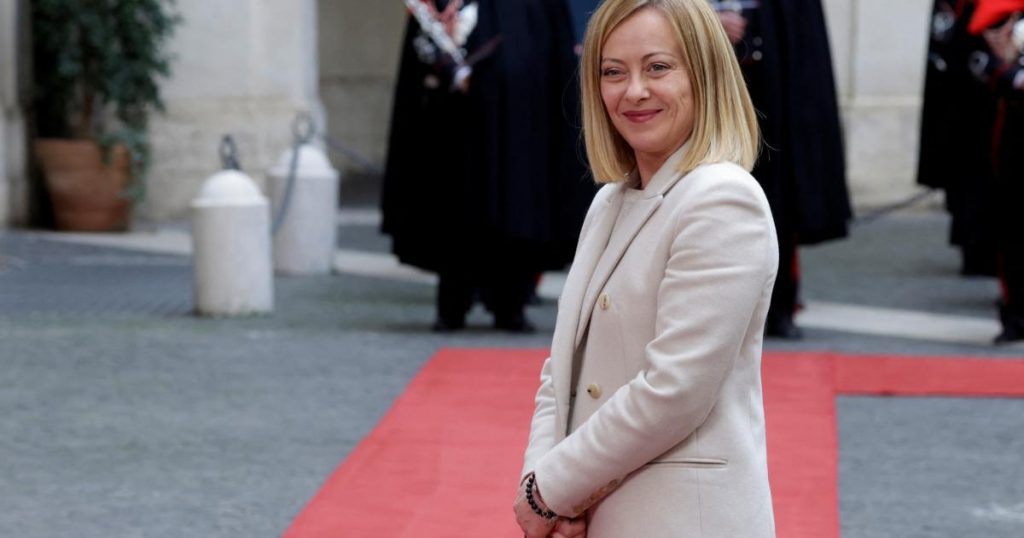As a far-right tide sweeps across the Atlantic, European liberal democrats are searching for a strategy. Some believe that they should erect stronger firewalls by refusing to join coalitions that include the far right to prevent its leaders from gaining political power. Others—for instance, Manfred Weber, the president of the center-right European People’s Party in the European Parliament—have advocated cooperating with certain far-right parties in the hope of cajoling specific leaders away from extremes by offering them a seat at the table.
Other centrists still assume that when right-wing populist provocateurs take office and face the real messiness of governing, they will move toward the center. Those who cling to this prospect hold up Giorgia Meloni, Italy’s far-right, pro-American prime minister, as an example. When Meloni rose to power in 2022, liberal democrats were deeply concerned: a self-declared admirer of Benito Mussolini, she presided over a party that prided itself on its fascist roots. But Meloni quickly maneuvered to dispel those worries, extending her predecessor’s support for a recently invaded Ukraine and affirming Italy’s staunch commitment to NATO. Given U.S. President Donald Trump’s predatory approach to Europe, some Europeans—particularly EU officials and Ukrainian leaders—imagined that figures such as Meloni could serve as “Trump whisperers,” persuading the American president to stick with European allies. Trump himself has often spoken warmly of Meloni, suggesting in December that if they worked together, they could “straighten out the world a little bit.”
But the hopes that moderates have harbored about Meloni are misplaced. As the transatlantic political environment has become more accepting of far-right views, she has tacked back to the right. There is no real proof that the act of governing is moderating Meloni; since mid-2024, evidence has piled up that her centrist shift was merely tactical. European liberal democrats should give up longing that, through flattery and inclusion, they can use far-right figures to mitigate Trump’s attacks on Europe. Instead, they must stress to far-right leaders the high cost of turning their backs on Europe—and the unlikelihood that Trump can prove a reliable ally.
CENTER OF ATTENTION
Over the course of ten years in Italy’s political opposition, Meloni rose to prominence as a staunch skeptic of further European integration, pushing for Italy’s exit from the eurozone and lambasting the EU bureaucracy in Brussels. Soon after she became prime minister, she appeared to do an about-face, backing Ukraine’s bid to join the EU and sustaining Italy’s military aid to Ukraine. She even seemed to shed her Euroskepticism, establishing strong personal ties with the president of the European Commission, Ursula von der Leyen, and refraining from blocking EU decisions on issues such as sanctions against Russia, aid to Ukraine, or added funding for the bloc’s budget.
Many who had fretted over her campaign warmed to her. U.S. President Joe Biden publicly praised Meloni for her commitment to the transatlantic relationship after their first bilateral meeting in July 2023, and von der Leyen repeatedly traveled with her on high-profile trips to Tunisia aimed at curbing irregular migration from Africa.
In policy circles, many Europeans began to see Meloni as a model for how the far right might be tamed. As far-right parties gained traction in Austria, France, Germany, Romania, Spain, and beyond in recent years, more traditional leaders have questioned whether it is wise even to try to keep them out of government. A lesson seemed to emerge in Italy, where the center-right formed a governing coalition with the far right in 2022: rather than mount an all-out battle to keep far-right parties from power, the thinking went, European center-right parties should work with those groups and in the process encourage them to moderate. Center-right parties in Belgium, Croatia, Finland, the Netherlands, and Sweden followed the Italian example.
But European moderates were far too quick to make Meloni a happy example. Meloni always pursued a nativist and socially conservative domestic agenda: in 2023, for instance, her government issued directives to local authorities not to register the birth of children to same-sex couples. Her adoption of a more centrist foreign policy did not show that tackling the complexities of government leads to moderation. It was the shield behind which she pursued more radical positions at home.
TURN COAT
It now seems clear that rather than arising from a change of heart, Meloni’s early pro-European maneuvers were intended to neutralize criticism. Less than two years after she took office, her policies began creeping rightward again—at first, in the domestic sphere. Meloni attempted to increase her control over Italy’s judiciary, lambasting the courts as political for hobbling her ability to offshore refugees to Albania. Her government sought to intimidate critical journalists and moved to replace top officials at Italy’s public broadcaster RAI, earning a public reprimand from the European Commission for restricting the media’s independence. And in late 2023, Meloni’s team proposed a reform of the Italian constitution to concentrate more power in the prime minister’s hands.
Gradually, the prime minister also began to pivot back toward the right on European issues and on foreign policy. When Italy took over the G-7 presidency in January 2024, for instance, it insisted on diluting or removing language supporting LGBTQ and abortion rights from the G-7 leaders’ final communiqué. Trump’s November 2024 election made the rightward shift easier. Last month, Meloni praised U.S. Vice President JD Vance when he denounced the “weakness” of Europe at the Munich Security Conference. Then, in an online address to the U.S. Conservative Political Action Conference (CPAC), she lashed out at the mainstream U.S. media, “woke” ideology, and a globalist elite.
Nowhere is Meloni’s gradual reversal more obvious than on Ukraine policy. Her 2022 support for Ukraine gained her the respect of her more moderate European peers as well as policymakers in the Biden administration. But once she secured that credibility, she began a distinctively incremental, nonconfrontational pivot to the right. Since Trump’s return to office, when possible, she has avoided talking about Ukraine altogether. When she has to, her tone is studied: in her CPAC speech, while addressing Ukraine’s need for security guarantees, Meloni omitted any mention of Ukrainian President Volodymyr Zelensky, Ukraine’s territorial integrity, or Russia’s role as the war’s instigator. In March, for the first time, her party abstained on a European Parliament resolution in support of Kyiv. She has criticized the idea of a “coalition of the willing” to defend Ukraine and rejected the notion of deploying Italian troops in the event of a durable cease-fire unless such a mission is mandated by the UN Security Council, where Russia and the United States have veto power.
This slow walk rightward may escape the notice of those accustomed to bombast from the far right. But it is a considered strategy: after taking each step, Meloni observes whether it has prompted pushback from her European peers, and takes the next one only if circumstances allow. She has not made any moves so abrupt as to trigger alarm bells, but the direction of travel is now clear.
BETTER TOGETHER
Meloni’s political shift has also revealed that the more right-wing politicians take office, the more strength and freedom they afford to one another. In 2023, Meloni had only one far-right peer in Europe: Hungary’s right-wing prime minister, Viktor Orban. Today, eight European governments include far-right parties, and two more—the Czech Republic and Romania—could gain far-right participants this year. In the 2024 European Parliament election, the far-right group of parties to which Meloni belongs won more seats than either the liberal or Green faction did.
Meloni no longer has to pretend to be pro-European. Much like Orban, however, she no longer advocates that Italy leave the EU or ditch the euro. Meloni knows that Italy benefits enormously from EU membership and that its fiscal predicament is fragile, given its monstrous public debt. Of the more than $800 billion in post-pandemic recovery funding allocated by the EU, Italy got a whopping $220 billion. So the prime minister chooses stances that are less disruptive: after last summer’s European elections, she voted against Antonio Costa, a social democrat, for president of the European Council and Kaja Kallas, a liberal, as the European Commission’s top diplomat. She abstained from approving von der Leyen’s nomination as the European Commission’s president, and her party went on to vote against von der Leyen’s successful confirmation.
Meloni knew that her opposition would not block or even delay the EU from reelecting its leadership. Without causing any real damage, the far-right Italian leader felt confident enough to begin revealing her Euroskeptic instincts again. In an appearance before the Italian Parliament in March, Meloni lashed out specifically against the vision of European integration advanced by Altiero Spinelli, an EU founding father.
Like Orban, on issues where her country can reap direct benefits from the EU, such as establishing collective European funds to induce North African leaders to curb migration, Meloni is all in. When it comes to furthering European integration, however, she now embraces changing the bloc from within through so-called bureaucratic simplification, a process she believes ought to include fewer regulations, the return of power to member states, and the adoption of fewer progressive laws, notably on climate change. She has expressed doubts about the EU’s plans to coordinate Europe’s defense and, in scathing terms, pooh-poohed French President Emmanuel Macron’s efforts to discuss a potential collective European nuclear deterrent.
RIGHT OF REFUSAL
The centrists who rushed to celebrate Meloni’s initial move toward the center should have been more skeptical from the start. Populist leaders tend to reveal their true colors gradually. In 2000, when Vladimir Putin was elected Russia’s president, Western leaders applauded his purported embrace of modernization, although his ruthlessness, revisionism, and authoritarianism were already on full display in Chechnya. In the mid-2010s, Turkish President Recep Tayyip Erdogan masterfully dispelled early concerns about his Islamist roots by inaugurating his rule with a wave of democratic reforms. Shifting gradually towards the extreme—and pushing more radical policies on the domestic front first—is smart because it doesn’t set off alarm bells globally. So long as there are no abrupt changes in a country’s strategic posture, most of what happens at home flies below the international radar.
If right-wing parties embrace gradualism, they can also trick their country’s center-right politicians into believing that they have more power over their hard-line compatriots than they really do. Centrists tend to believe that they can educate the far right into moderation. But with the possible exceptions of Finland and Sweden, recent European history shows that when the center-right starts cooperating with the far right, the far right ends up dominating. This is what has happened in Italy. After the center-right, long the dominant force on Italy’s right wing, normalized the far-right fringe’s participation in the political system, that fringe’s successor—Meloni’s party—came to rule the Italian right. The same process has been accomplished or is now happening in Austria, France, and the Netherlands.
Like other far-right leaders in Europe, Meloni would genuinely like to see the United States and Europe stick together. She believes the two entities comprise the core of a white, Christian West that can grow stronger if the far right consolidates power. There are huge contradictions within this worldview, the so-called “sovereigntist international” ideology, as nationalists often struggle to cooperate and end up damaging one another’s interests—an effect already on display as Trump begins his presidency.
Populist leaders tend to reveal their true colors gradually.
In his second term, Trump clearly intends not to ignore Europe but to actively undermine it. He has made it obvious that Europe can no longer depend on a U.S. security umbrella and argued that European countries should spend as much as 5 percent of their GDP on defense—substantially more than the 3.4 percent the United States itself spends. Although the average European country’s defense spending has increased to just over 2 percent of GDP, Italy remains a laggard, spending only 1.5 percent. Trump characterizes the EU as a mechanism for ripping off the United States and has already begun imposing some heavy tariffs on EU products.
Around a third of the EU’s trade surplus with the United States is generated by Italy, so Trump’s tariffs will harm Italy disproportionately. When that issue arises, Meloni has shown visible discomfort.In short, no matter how much ideological affinity Meloni and Trump might have, the MAGA movement will damage all European countries, Italy included. In a transactional world order in which nationalism prevails, small- to medium-size states—in other words, European states, if they are divided—will be among the first to suffer. Politics draws far-right parties across the Atlantic together, but policy will force them apart.
On issues such as trade and regulating technology, far-right governments even risk becoming Trojan horses in the EU. By slowing or blocking policies aimed at making Europe a stronger collective actor, they serve Trump’s desire to see Europe weak and divided. In recent years, far-right governments have enjoyed substantial freedom to pick and choose which pro- and anti-European initiatives they back. But as Trump seeks to undermine Europe’s security and economy, far-right European parties will have less space to dwell in ambiguity. Their leaders may have to choose between Europe and Trump.
Yet pro-European forces cannot afford to sit and watch or, worse, try to court far-right figures such as Meloni as potential “Trump whisperers.” Rather than attempt to seduce far-right leaders, liberal democrats in Europe should work to reveal the contradictions in these leaders’ politics. As far-right populist leaders proudly purport to represent the people, European moderates must point out that there is nothing patriotic about their support for Trump and his drive to undermine Europe’s security and prosperity. Only by exposing these inconsistencies—and highlighting the steep costs, in the Trump era, of disrupting Europe’s cohesion—can liberal democrats protect Europeans from the forces that seek to subjugate them.
Loading…








